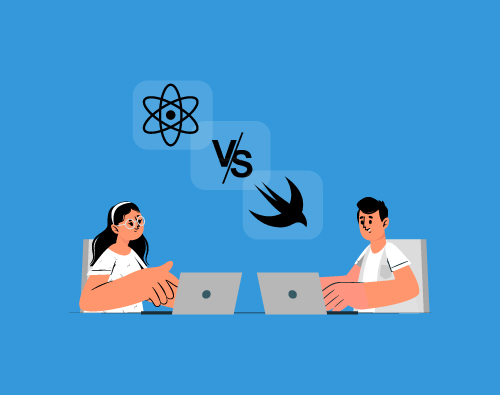React Native vs. Swift: Pick the Perfect Mobile App Development Framework for Your Business


In today’s digital landscape, mobile app development has become essential for businesses to connect with their target audience. The choice of app development framework plays a crucial role in the success of your app. Two popular frameworks that businesses often consider are React Native and Swift. In this article, we will explore the differences between React Native and Swift and help you make an informed decision when choosing the right framework for your custom app development needs.
React Native stands out as a powerful cross-platform solution for mobile app development. Leveraging JavaScript, it enables developers to build robust applications compatible with both iOS and Android platforms, minimizing duplicative efforts. By utilizing a single codebase, React Native accelerates development cycles, reducing time-to-market significantly. Its modular and component-based architecture fosters reusability, streamlining maintenance and updates across platforms. This framework capitalizes on a vast ecosystem of libraries and community support, empowering developers to create high-performance, native-like experiences. With its efficiency in code sharing and seamless integration of native components, React Native remains a go-to choice for building versatile, cross-platform mobile applications.
Cross-Platform Development: React Native enables developers to build applications that work seamlessly on both iOS and Android platforms using a single codebase. This significantly reduces development time and cost, as developers don’t need to write separate code for each platform.
Hot Reloading: Developers can see the changes they make in real-time with React Native’s hot reloading feature. This significantly speeds up the development process by allowing instant preview and debugging without the need to recompile the entire app.
Large Community and Ecosystem: React Native has a vast community of developers contributing to its growth. This means access to a wide range of libraries, tools, and third-party plugins, which can expedite development and offer solutions to various challenges.
Cost-Effectiveness: Building an app with React Native can be more cost-effective compared to developing separate native apps for iOS and Android. The shared codebase and streamlined development process reduce both development time and resources required.
When considering React Native for your custom app development, take into account the following factors:
Cross-platform Compatibility: React Native allows for building applications that work across both iOS and Android platforms, sharing a significant portion of the codebase. This is advantageous for businesses aiming to reach a broader audience with their mobile app while minimizing development efforts.
Development Speed: React Native offers a faster development cycle compared to building separate native apps for iOS and Android. Its hot reloading feature allows developers to instantly see the changes made in the code, speeding up the debugging and development process.
Community and Ecosystem: React Native benefits from a robust community of developers contributing to its ecosystem. This means access to a wide range of libraries, components, and tools that can accelerate development and resolve issues efficiently.
Performance: While React Native provides good performance for most applications, it might not match the native performance of applications built exclusively for iOS or Android. However, optimizations and native modules can be implemented to address performance-critical parts of an app.
Native Capabilities: React Native allows access to native device functionalities through native modules or third-party libraries. However, the availability of certain native features might be limited or delayed compared to platform-specific development.
Swift, the cornerstone of iOS app development, forms the bedrock of native iOS applications. As Apple’s modern, powerful programming language, Swift offers a seamless blend of efficiency and clarity, enabling developers to craft robust, high-performance apps. Its concise syntax and safety features streamline the development process, fostering cleaner code and reducing errors. Leveraging Swift’s rich set of frameworks and libraries empowers developers to build innovative, user-centric experiences. From its flexibility in handling memory management to its dynamic features like optionals and closures, Swift serves as the fundamental framework for creating intuitive, scalable, and cutting-edge iOS applications.
Safety First: Swift is designed with safety in mind. Its syntax encourages the writing of clean and error-free code, reducing common programming errors and preventing crashes and bugs. Features like optionals, type interference, and automatic memory management contribute to building more robust applications.
Speed and Performance: Known for its lightning-fast performance, Swift is built with performance optimization in mind. It offers near-native speed, which makes it an excellent choice for resource-intensive tasks, such as gaming or multimedia applications.
Readability and Maintainability: Its clear and concise syntax makes Swift highly readable, making it easier for developers to understand and maintain code. The language is expressive and requires fewer lines of code compared to Objective-C, enhancing productivity and reducing development time.
Interoperability: Swift is designed to work seamlessly with Objective-C, allowing developers to use both languages within a single project. This interoperability enables the reuse of existing Objective-C codebases while integrating new Swift features, providing flexibility in development.
Playgrounds for Experimentation: Swift Playgrounds provide an interactive environment for developers to experiment with code snippets and algorithms in real-time. This feature allows swift (pun intended) prototyping, testing, and learning without the need to build an entire application.
When considering Swift for your custom app development, consider the following factors:
Performance: Swift is known for its speed and efficiency, offering performance comparable to C++ and Objective-C. Its high-performance capabilities make it ideal for resource-intensive tasks.
Safety: With its strong typing system and error handling features, Swift significantly reduces common programming errors. The language is designed to prevent crashes and errors, fostering a more stable codebase.
Clarity and Readability: Swift’s syntax is concise and expressive, making it easier to read and write code. Its modern language features and clean syntax promote code readability, enhancing collaboration among developers.
Compatibility: Swift seamlessly interoperates with Objective-C, allowing developers to incorporate existing Objective-C code into new Swift projects. This compatibility ensures a smoother transition for projects in the Apple ecosystem.
Community Support: Swift benefits from a robust and growing community of developers. This active community contributes to an extent.
When choosing the right framework for your custom app development, consider the nature of your application, development speed and cost, performance and user experience, and long-term maintenance and scalability.
If your application needs to run on multiple platforms and cost-effectiveness is a priority, React Native is an excellent choice. It allows you to develop once and deploy on both iOS and Android devices, reducing development time and costs.
On the other hand, if your focus is on building native iOS applications with optimal performance and deep integration with Apple’s ecosystem, Swift is the preferred option. It provides access to the full range of iOS features and ensures a seamless user experience on iOS devices.
Regardless of the framework you choose, partnering with a reputable custom app development company is crucial for the success of your project. A company like BizBrolly Solutions, with its expertise in React Native and Swift development, can guide you through the decision-making process and help you build a high-quality, feature-rich app tailored to your specific business needs.
In conclusion, React Native and Swift offer distinct advantages for custom app development. By carefully considering your business requirements and goals, you can select the framework that aligns best with your needs and delivers a successful mobile app to your target audience.

In recent years, artificial intelligence (AI) has rapidly advanced, with neural ...
Explore more
Cloud computing is transforming the manufacturing industry by making it easier t...
Explore more


D-23, Sector 63, Noida,
UP - 201307

141 Westgate Dr, Edison,
NJ - 08820

4 Black lion court, Mill road, Kent, UK – ME71HL

2207, 2220 Lakeshore Blvd W, Toronto ON- M8V0C1

94A Central Road, Jacanlee, Johannesburg 2194